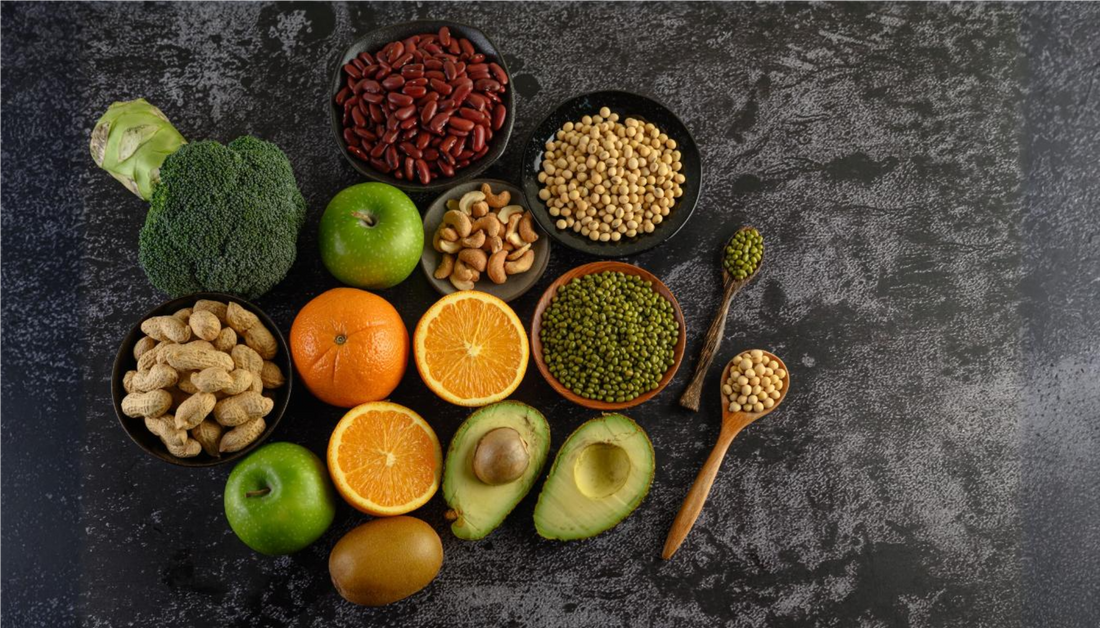Top 15 Indian Superfoods for Wellness: Exploring Nutrient-Packed Foods and Their Benefits

Most of the foods used in India in their rich food culture are not only absolutely delicious but are also incredibly nutrient-dense and support overall wellness. Such "superfoods" are integral because they pack on vitamins, minerals, antioxidant compounds, and healthy fats necessary for boosting energy, boosting immunity, and growing longevity. From anti-inflammation in turmeric to the complete line of omega-3 fatty acids in flaxseeds. This guide discovers these superfoods, their special advantage, and how they could be incorporated into the daily diets. Let's discuss the potential of these nutritionally rich foods for a healthy bodily condition.
Introduction
India is the country of origin of many nutritionally charged food products. Majority of them have wonderful health benefits. Flaxseeds and chia seeds are wealthy sources of omega-3 fatty acids, supporting health issues like heart and mental disease. Then there is turmeric, which has anti-inflammatory properties; it works miraculously to improve immunity and brain function.
Highly nutritious and filled with antioxidants, moringa not only boosts energy but also rids weakness. Amla is another superfood that seems to be otherwise known as Indian gooseberry; it contains so much vitamin C that makes for the best immunity and youthful appearance. All these superfoods put together in your diet may mean a lot to ensure well-being to your entire body.
Definition and significance of superfoods
1. Superfoods are nutrient-rich foods, often rich in vitamins and minerals, antioxidants, and healthy fats, providing sensational health benefits that go beyond basic nutrition.
2. The significance arises since they can make the entire health system stronger, boost immunity, and thereby highly reduce the risk of chronic diseases.
3. Including superfoods in our diet can make us use their strong qualities to support improved mental and physical well-being. In the end, these foods are our natural companions on the way to optimal health.
There are nineteen micronutrients, which include vitamins and minerals, that aid the utilization of macronutrients through enhancing metabolic functions, improving bioavailability, and maintaining the balance of bacteria. Such nutrients are mostly well-covered in research on functions in metabolism, critical for survival and good health.
Top Superfoods to Include in Your Diet
Adding superfoods to your daily diet can boost muscular wellness.
1. Grain is a complete protein that is rich in abundant vital amino acids.
2. Researched with antioxidants and vitamins to help reduce inflammation and boost immunity, leafy greens are a nutritional dynamo.
3. Apart from the high antioxidant content the blueberries are known for in aiding reasoning capabilities and supporting brain power, blueberries will boost your overall health for many more reasons.
Detailed exploration of 10-15 superfoods
This is one of the special reviews of ten superfoods that can be found in India and which highlights specific advantages:
- Turmeric: This has been termed the "golden spice." It holds within it an incredibly potent anti-inflammatory called curcumin. It also supports the immune system and even helps improve mental processes.
- Amla: Amla is a highly nutritious fruit that is rich in antioxidants and vitamin C. As such, it is great for supporting a healthy immune system, digestion, and skin.
- Flax Seeds: These tiny, nutrient-dense nuts are full of fatty acids that support brain function, heart health, and weight control.
- Chia Seeds: These are tiny black seeds which include fiber and omega-3 that might improve the digestion level, increase the energy level, and reduce sugar level in the blood; it expands with water.
- Ginger: The "spice of life" is what sometimes ginger is called. It will reduce inflammation, even alleviate nausea.
- Bitter Gourd (Karela): This is a most commonly used vegetable, and it is an enemy of diabetes, as it regulates the blood sugar levels and also gives them essential nutrients besides creating a healthy digestive system.
- Coconut: This multitasking coconut produces oil and water, and it's full of MCTs, medium-chain triglycerides, that supply you with energy while keeping your heart clean and healthy.
- Sweet potatoes: Sweet potatoes are delicious companions to food, rich in fiber and a stuff called beta, which improves the health of your eyes and gives you long-lasting energy.
- Pomegranate: Filled to bursting with antioxidants that help boost heart health and even sharpen memory and cognitive skills, it comes pre-seed with those gorgeous, jewel-like seeds.
- Spinach: This super leafy green is packed with vitamins A, C, and K, which work miracles by enhancing your immunity, strengthening your bones, and granting you excellent eyesight.
- Walnuts: Mother Nature's brain food, Walnuts come replete with a role of omega-3 fatty acids, thus supposedly enhancing cognitive health and mood, and thereby working to reduce heart disease.
- Cinnamon: It contains anti-inflammatory properties and helps with regulation of blood sugars as well as heart health.
- Green Tea: The classic tea, green tea, has a rich flavor and is a powerful antioxidant powerhouse, particularly in the form of catechins, which may help support weight loss and improve brain function.
- Orange: Antioxidants and vitamin C abound in oranges. They aid in the development of the immune system, enhance skin appearance and maintain heart health.
- Avocados: A nutritious food with a smooth consistency, avocados are extremely high in heart-healthy monounsaturated fats that lower cholesterol and preserve cardiac health.
Health benefits and nutritional profiles
Curcumin: it is abundant in turmeric, is rich with anti-inflammatory and antioxidant properties for joint health, boost immunity of the body, and can reduce chronic diseases.AMLA: It is a rich source of antioxidants and vitamin C and thus helps achieve healthy skin, enhances immunity, smoothens digestive issues, and supports natural body detoxification.
Moringa: The superfood moringa, full of calcium, iron, and the vitamins A, C, and E that reduce inflammation, increase energy, and promote overall better health.
Quinoa: It is a complete protein with every one of the nine essential amino acids, fiber, magnesium, and iron, making it a prime choice for enhancing digestive health, building great muscles, and general health.
How to Incorporate Superfoods into Meals
Turmeric can be added to smoothies or curries to add a tasty nutritional boost when superfoods are included in meals. To add extra nutritional density, add leafy greens like spinach or moringa to salads, dals or stir-fries. Otherwise, you can add chia or flax seeds to your smoothie or sprinkle them over yogurt or oatmeal for that extra dose of fiber and omega-3 fatty acids.
Recipe ideas and meal planning tips
Some superfood-rich dishes and meal planning ideas that can easily be infused into Indian cuisine are as follows:
Amla Chutney: Add flavor and nutrition to idli, dosa, or roti by blending together fresh amla, green chilies, ginger, and spices to create a tasty chutney.
Rice with Turmeric: Turmeric, cumin, and mixed veggies help cook up a brightly hued basmati rice side that would really go great with a curry or a dal.
Moringa Smoothie: With the powder, you can create an excellent and healthy smoothie: Take powder, bananas, yoghurt, and honey in a mixture to create a very tasty smoothie which is well working for breakfast or mid-afternoon.
The Science Behind Superfoods
Superfoods are filled with a massive content of vitamins, minerals, antioxidants, and plant compounds.
1. They promote a lot of health benefits. According to a scientific study, based on optimal biological functioning and improved metabolic health, they have been proven to enhance wellness overall, to reduce inflammation and most importantly, to eliminate the risk of chronic diseases.
2. The modern scientific domain of nutrition science has knowledge of basic nutrients. There are three primary nutrients used by the body to construct biological structures and provide energy for physiological functions, and these are macromolecules, which include proteins, carbs, and fats.
Nutritional studies and evidence
Indian researches have proven that superfoods like amla and turmeric reduce the rate of chronic diseases and improve general well being.
1. Quinoa may be among the important ones bridging protein deficiency gaps in Indian diets, especially among vegetarians, research suggests.
2. Nutrition research shows that inclusion of moringa in diets prevents frequent deficiency in the population by increasing appreciably iron and calcium consumption.
3. Clinical evidence is testimony to the fact that fiber in diet-rich whole grains and legumes enhances gut health and metabolic variables, so the importance of plant-based foods is brought forward in Indian cooking.
Common Misconceptions about Superfoods
It is conveniently believed in India that superfoods are rare and expensive, so people ignore the nutrition-rich and relatively easy availability of much traditional foodstuff such as lentils, amla, and turmeric. Also, it has wrongly been believed that superfoods can alone revamp one's health; instead, good health only comes from proper nutrition and lifestyle.
1. Interactions between drugs and dietary factors might reduce a medicine's effectiveness or increase side effects. In this case, if calcium in dairy products reduces the absorption of tetracycline and quinolone antibiotics, they may be less effective in treating infections.
2. It is also known that certain foods, such as banana, grapefruit, apple and orange juices, soybean meal, walnut, and high fiber diets can change the pharmacokinetics and pharmacodynamics of various drugs and lead to potential health risks.
Addressing myths and marketing claims:
Overestimated health Description: Superfoods are usually sold as magic cures for nearly all health issues but, on the other hand, it is urgently important to acknowledge that no food at all can be a substitute for any well-balanced diet or for medical treatment; overall dietary patterns and lifestyle choices are much more significant indicators of one's general level of health.
Cost vs. Benefit: The error is the misconception that superfoods have to be costly. However, most such domestically accessible foods such as spices, leafy greens, and legumes are as nutrient-dense and highly impactful on health with a controlled cost.
Conclusion:
Superfoods are a great way to add critical nutrients that help enhance both physical and mental health, thus bringing about overall wellness. Supplements are so convenient and pack concentrated advantages; however, in regard to maximizing benefit through the kind of synergistic power that nature's offerings pack with nutrients, a balanced diet rich in whole foods should form the basis of your diet. Long-term nutritional benefits can be acquired and the quality of life improved by embracing a natural diet and accepting a range of superfoods.
FAQ’S:
1. What are the health benefits of superfoods?
The superfoods contain high amounts of vitamins and minerals and a high level of antioxidants. This coupled with the numerous health benefits towards inflammation reduction, improvement of the immune system.
2. How can I add superfoods to my daily diet?
Add some superfoods like spinach, quinoa, or berries to your salads and smoothies. And if you would like to have something even more amazing, add turmeric to your recipes and sprinkle chia or flaxseed on top of yogurt.
3. Are superfood supplements effective compared to whole foods?
Superfood supplements offer concentrated nutrients, but there may be some loss in the complete benefits derived through whole foods, such as added fiber and phytochemicals.
No comments
























0 comments